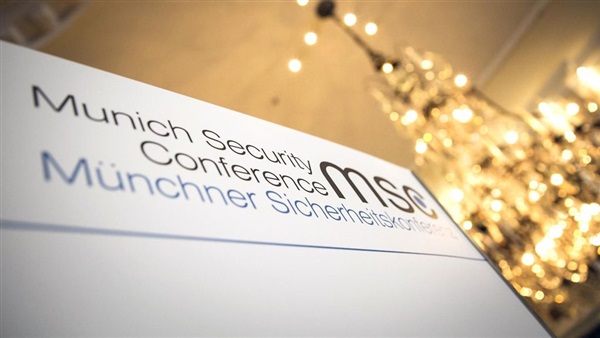Hot topics to be discussed as global leaders gather in the 56th Munich Security Conference

The 56th Munich Security Conference (MSC) is
scheduled to kick off in the southern German city of Munich on Friday and run
through Sunday.
The annual conference is taking place in the
Bavarian capital from February 14 to 16. International security policy makers
will meet to exchange views on common threats and future challenges.
Politicians from all over the world come to Munich
for the security conference. High-ranking guests included 18 heads of
government, 18 heads of state and 91 ministers are expected to attend the conference
at the Hotel Bayerischer Hof in Munich's city centre.
This year’s attendees include French President
Emmanuel Macron, Secretary of State Mike Pompeo, NATO Secretary General Jens
Stoltenberg, Chinese Foreign Minister Wang Yi, Director-General of the World
Health Organization Tedros Adhanom Ghebreyesus and Iranian Foreign Minister
Mohammad Javad Zarif.
The theme of the conference, highlighted in the 2020
Munich Security Report, focuses on the feeling of “westlessness” — a widespread
uneasiness that Western countries are becoming “less Western.”
“Recent years have seen estrangement and diverging
positions on crucial policy challenges — ranging from arms control and global
trade to climate change or the role of international institutions,” wrote the
authors of the report.
This year’s conference is expected to gauge
international reaction to the Trump administration’s unpredictable foreign
policy, frequent trade battles and use of military force as the U.S. braces for
a presidential election.
The Trump administration has pulled the U.S. back
from global commitments while pushing for the denuclearization of North Korea,
escalating tensions with Iran, engaging in a bitter trade war with China and
continuing efforts to negotiate the end of the U.S. war in Afghanistan.
“The prime challenge will be to agree on a common
transatlantic or broader Western approach, as the ongoing difficulties in
dealing with Russia, China or Iran demonstrate,” the Munich Security Report
authors wrote.
After a U.S. strike under President Donald Trump's
orders killed Qassem Soleimani, former commander of the Quds Force of Islamic
Revolution Guard Corps, the international community fears an uncontrolled
conflict between the United States and Iran.
Iran's Foreign Minister Mohammad Javad Zarif is seen
as a frequenter in the MSC and often makes vital speeches.
His statement will probably be even more
attention-grabbing this year against the backdrop of U.S.-Iran tensions, with
Zarif's U.S. counterpart Pompeo expected to voice his views at the forum.
The conference is also an important platform for
discussing the future strategies of American foreign policy, as one of the
topics that will enjoy an interesting debate is the Middle East peace plan
announced by US President Donald Trump in the first month of 2020, which did
not receive positive feedback from the Palestinian leadership, However, unlike
other actors, Washington, under Trump's leadership, presented a detailed
concept that was supposed to find solutions based on a just solution for all
parties.
Besides the US President, his archenemy at home,
Speaker of Congress Nancy Pelosi, is participating in the conference, along
with a number of members of the two main parties in America. Therefore, some
altercations are expected to move from Washington to Munich
The confrontations between different warring
factions in Libya will also be one of the major topics, according to Wolfgang
Ischinger, chairman of the MSC.
Countries concerned with the North African country's
long-running conflict, such as Turkey, Saudi Arabia, France and Italy, will
discuss ways to end it.
Just three weeks ago also in Germany, the related
countries agreed to stop military support to the warring parties while a
cease-fire lasts, a step seen by analysts as a glimmer of hope to give Libyans
space for a political reconciliation.
The war, however, has only become more intractable,
as the factions accused each other of violating a truce and there was no
mechanism capable of making embargo violations costly to perpetrators.
German Foreign Minister Sigmar Gabriel addresses the
54th Munich Security Conference (MSC) in Munich, Germany, on Feb. 17, 2018. As
state leaders, officials and experts are discussing the world's major political
issues at the ongoing Munich Security Conference, it is of great importance to
stress the role of multilateralism in addressing security issues.
Coronavirus
A panel discussion on global health security will be
held at this year's MSC.
Regarding the outbreak of the novel coronavirus
mostly in China but also in some other countries, Director-General of the World
Health Organization Tedros Adhanom Ghebreyesus is set to address the panel.
China's State Councilor and Foreign Minister Wang Yi
will also deliver a keynote speech, talking about the Chinese government and
people's concerted efforts and progress in fighting the epidemic and about
advancing international cooperation against it.







